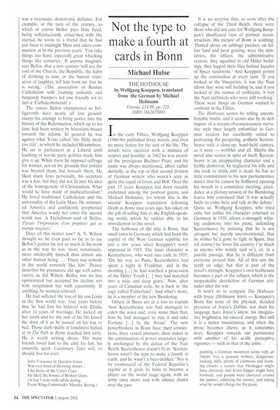Not the type to make a fourth at cards in Bonn
Michael Hulse
THE HOTHOUSE by Wolfgang Koeppen, translated from the German by Michael Hofmann Granta, 114.99, pp. 221, ISBN 1862075093 In the early Fifties. Wolfgang Koeppen (1906-96) published three novels, and then no more fiction for the rest of his life. The novels were received with a mixture of respect and hostility; in 1962 he was awarded the prestigious Buchner Prize; and his name was always mentioned, albeit rather dutifully, at the top of that second division of German writers who weren't seen as quite the equal of Grass and Boll. Over the past 15 years Koeppen has been steadily enshrined among the postwar greats, and Michael Hofmann, for whom this is the second Koeppen translation following Death in Rome nine years ago, has taken on the job of selling him to the English-speaking world, which he tackles ably in his introduction to this novel.
The hothouse of the title is Bonn, that small town in Germany which had been the capital of the West German republic for just a few years when Koeppen's novel appeared in 1953. The main character is Keetenheuve, who went into exile in 1933: 'On his way to Paris, Keetenheuve had spent a night in Frankfurt, and in the morning [...] he had watched a procession of the Hitler Youth [...] they had marched into a wide and deep grave.' Now, after years of Canadian exile, he is back in 'the cage called Fatherland'. And what's more, he is a member of the new Bun destag.
Others in Bonn are at a loss to explain 'how Keetenheuve too had managed to catch the wave and, even more than that, how he had managed to ride it and take Fortune [...] by the throat'. The new powerbrokers in Bonn have their connections, their vested interests, their stakes in the continuation of power structures largely unchanged by the defeat of the Nazi Reich. Keetenheuve doesn't tit in. `Keetenheuve wasn't the type to make a fourth at cards, and he wasn't a beer-drinker.' Nor is he enamoured of the Federal Republic's regime as it girds its loins to become a player on the world stage again, with an army once more and with silence drawn over the past. It is no surprise that, so soon after the collapse of the Third Reich, there were those who did not care for Wolfgang Koeppen's disaffected view of postwar reconstruction. His picture of Bonn is scathing: 'Dotted about on cabbage patches, on fallow land and poor grazing, were the ministries, the offices, the administrative centres, they squatted in old Hitler buildings, they lugged their files behind facades of Speer sandstone.' And Koeppen points up the continuities at every turn: 'If you looked at the blueprints, it was the Nazi idiom they were still building in, and if you looked at the names of architects, it was the Nazi architects who were still working.' These were things no German wanted to confront in the Fifties.
The Hothouse scores by telling uncomfortable truths, and it scores also by its deft import of a stream-of-consciousness narrative style then largely unfamiliar to German readers but excellently suited to portraying the perspiring, pathetic Keetenheuve with a close-up, hand-held camera, as it were — wobbles and all. Maybe the novel also scores in spite of itself. Keetenheuve is an unappealing character and a feeble democrat: he neglected his wife and she took to drink and is dead; he has so little commitment to his new parliamentary duties that he cannot be bothered opening his mouth in a committee meeting; attendance at a plenary session of the Bundestag leaves him convinced that 'it was actually futile to come here and talk in the debate'. Quite so. Wolfgang Koeppen, who tried exile but unlike his character returned to Germany in 1938, allows a strangely whining undertone into his prose, defending Keetenheuve by insisting that he is not arrogant but merely unconventional, that he wishes he'd gone to fight in Spain, that (of course) he loves his country ('as much as anyone who noisily said so'), or, in a puerile passage, that he is different from everyone around him. All of this sets the teeth on edge; but that is part of the novel's strength. Koeppen's own feebleness becomes a part of the subject, which is the unspeakable dereliction of German attitudes after the war.
It won't do to compare The Hothouse with Joyce (Hofmann tries) — Koeppen's Bonn has none of the physical, detailed presence of Joyce's Dublin, nor does his language have Joyce's sinew, his imaginative brightness, his visceral energy. But still it is a minor masterpiece, and when the prose becomes chewy, as it sometimes does, Koeppen rewards our persistence with another of his acidly perceptive vignettes — such as that of the artist
painting a German mountain scene with an Alpine hut, a peasant woman, dangerouslooking cliffs, plenty of edelweiss and looming clouds, a nature that Heicleager might have invented, and Ernst hinger might have bestrode, and people were clustered around the painter, admiring the master, and asking what he would charge for the piece.


























































 Previous page
Previous page